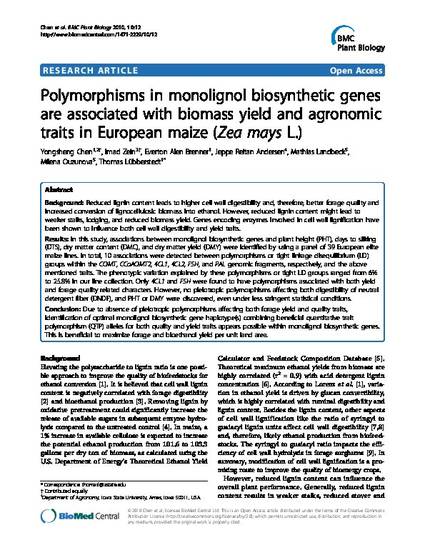
Background
Reduced lignin content leads to higher cell wall digestibility and, therefore, better forage quality and increased conversion of lignocellulosic biomass into ethanol. However, reduced lignin content might lead to weaker stalks, lodging, and reduced biomass yield. Genes encoding enzymes involved in cell wall lignification have been shown to influence both cell wall digestibility and yield traits. Results
In this study, associations between monolignol biosynthetic genes and plant height (PHT), days to silking (DTS), dry matter content (DMC), and dry matter yield (DMY) were identified by using a panel of 39 European elite maize lines. In total, 10 associations were detected between polymorphisms or tight linkage disequilibrium (LD) groups within the COMT, CCoAOMT2, 4CL1, 4CL2, F5H, and PAL genomic fragments, respectively, and the above mentioned traits. The phenotypic variation explained by these polymorphisms or tight LD groups ranged from 6% to 25.8% in our line collection. Only 4CL1 and F5H were found to have polymorphisms associated with both yield and forage quality related characters. However, no pleiotropic polymorphisms affecting both digestibility of neutral detergent fiber (DNDF), and PHT or DMY were discovered, even under less stringent statistical conditions. Conclusion
Due to absence of pleiotropic polymorphisms affecting both forage yield and quality traits, identification of optimal monolignol biosynthetic gene haplotype(s) combining beneficial quantitative trait polymorphism (QTP) alleles for both quality and yield traits appears possible within monolignol biosynthetic genes. This is beneficial to maximize forage and bioethanol yield per unit land area.
Available at: http://works.bepress.com/thomas-lubberstedt/46/

This article is published as Chen, Yongsheng, Imad Zein, Everton Alen Brenner, Jeppe Reitan Andersen, Mathias Landbeck, Milena Ouzunova, and Thomas Lübberstedt. "Polymorphisms in monolignol biosynthetic genes are associated with biomass yield and agronomic traits in European maize (Zea mays L.)." BMC plant biology 10, no. 1 (2010): 12. doi: 10.1186/1471-2229-10-12. Posted with permission.